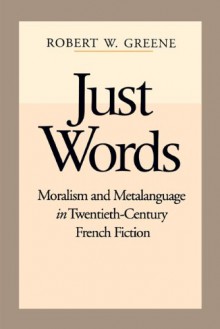Just Words: Moralism and Metalanguage in Twentieth-Century French Fiction
Are the words that a novelist uses adequate to his or her elusive subject-- the human condition? Are they pertinent, accurate, invariably fair, unflinchingly honest? Or do the novelist's words execute essentially formal maneuvers, engaging our interest through their patterns rather than their...
show more
Are the words that a novelist uses adequate to his or her elusive subject-- the human condition? Are they pertinent, accurate, invariably fair, unflinchingly honest? Or do the novelist's words execute essentially formal maneuvers, engaging our interest through their patterns rather than their reach? And what about a possible third, synthesizing option? Robert W. Greene discovers that the two apparently divergent intentions in question (metalinguistic vs. moralistic) often paradoxically coexist in French fiction. Also, no doubt because it is more consistently self-conscious than that of any previous era, the fiction of twentieth -century France seems to illustrate this convergence with special brillance.From L'lmmoralist (1902) to L'Usage de la parole (1980) Greene explores combinations and permutations of moralistic analysis and metalinguistic commentary in a particular sequence of prose narrative. Along the way, he observes Gide, Proust, Malraux, Camus, Duras, and Sarraute, each in his or her own fashion, moving ceaselessly back and forth between soundings of the heart and diagnoses of the tongue.
show less
Format: Hardcover
ISBN:
9780271008998 (0271008997)
ASIN: 0271008997
Publish date: 1993-07-13
Publisher: Pennsylvania State Univ Pr (Txt)
Pages no: 208
Edition language: English

